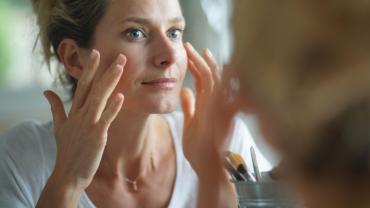
All skin layers are affected by the aging process, which may involve a decreased barrier function, dermal thinning, and a loss of elasticity. Changes during the aging process, both in the skin and the rest of the body, can occur at the cellular level and may include increases in inflammation and oxidative stress. Cellular senescence is a cellular process that often occurs during normal aging in which certain cells, after becoming stressed or damaged, may become harmful to other tissues and organs in the body. It is a potential driver of many biological processes leading to age-related diseases. Senescent cells may harm neighboring cells in by creating damage to the composition of the extracellular matrix (ECM) and by secreting certain pro-inflammatory cytokines.
Recent studies indicate that resveratrol (trans-3,4’,5 trihydroxystilbene), a polyphenolic molecule found in grape skin, dark berries, and peanuts, may support skin health and the body’s response to senescent cells. Resveratrol is known for its role in supporting a healthy response to oxidative stress and inflammation and for its ability to support cardiovascular and metabolic functions. It has been shown in animal and laboratory studies to influence the activity of proinflammatory cytokines such as interleukin (IL)-1β, IL-6, IL-17, and tumor necrosis factor-α (TNF-α).
Resveratrol acts to support antioxidative status by targeting the transcription factor Nrf2 and helping support antioxidant protein expression and modulating mitochondrial generation of reactive oxygen species (ROS). It also inhibits cyclooxygenase (COX)-1 and COX-2, thus downregulating the synthesis of prostaglandins and leukotrienes and the expression of nuclear factor-κB (NF-κB).
Recent research indicates resveratrol may support age-related cellular changes and epithelial health. Resveratrol has been shown in laboratory studies to help support healthy apoptosis and mitochondrial function. Clinical studies have also demonstrated that resveratrol may help improve elasticity, moisture content, total wrinkled area, and total wrinkle volume. In addition, laboratory studies have observed increased levels of autophagy of senescent macrophages in the presence of resveratrol.
A placebo-controlled double-blind study explored the potential efficacy of supplementation with resveratrol on parameters related to aging and skin health in 50 individuals. The treatment group received 133 mg of resveratrol daily for 60 days. Improvements in antioxidative capacity, skin elasticity, skin roughness, and depth of wrinkles were observed in the treatment group, as well as significant decreases in the intensity of age spots.
More research is needed before clinical conclusions can be made, particularly larger clinical studies with standardized treatment amounts and in more skin types. However, resveratrol may support immune function, a healthy inflammatory response, and the body’s response to cellular senescence and aging. It may also support cardiovascular health, antioxidative status, and metabolic health.
By Dr. C. Ambrose, ND, MAT